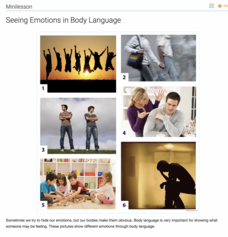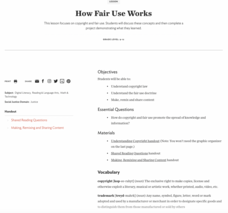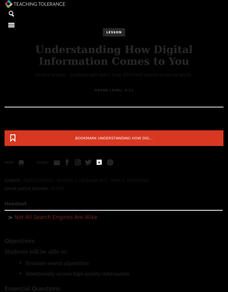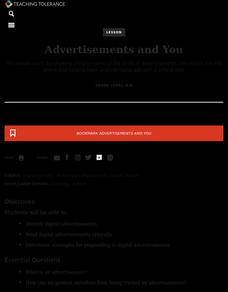iCivics
Step Four: Working with Websites
Almost every profession today relates to websites in some way! The resource tasks the class to fill out three individual graphic organizers to help them analyze each website they visit.
Judicial Learning Center
The Federalist Papers and The Federal Judiciary
Pupils work in groups or as individuals to read about and then discuss the Federalist Papers. To finish, they write essays about an assigned topic dealing with the Federalist Papers and the federal judiciary.
ESL Holiday Lessons
Bastille Day
Eleven worksheets follow an informative reading about Bastille Day. Scholars complete sentences found in the reading by matching, filling in the blanks, and choosing from a series of multiple-choice questions. Participants spell and...
CK-12 Foundation
Addition of Integers: Number Blocks
A five-question interactive provides a horizontal number line where integers are stacked on top of one another to find solutions of addition problems. Mathematicians move numbers to the numbers line, as numbers build higher, the sum of...
ABCya
Christmas Lights
An interactive adds a bright touch to the holiday season with a learning game that challenges scholars to hang 250 Christmas lights. Once the outside of a house is decorated, participants have the choice to see their work light up to a...
Radford University
Percentages: Lesson 1
Math can be taxing at times. With a short lesson, pupils determine how income tax affects take-home pay. Learners determine their net pay based on tax tables and how adjustments in their gross pay changes the paycheck.
Purdue University
Tree Talk
Examining tree rings shows more than just age. The third installment of a five-part Family Nature Program unit has learners examine all parts of trees including tree rings to tell stories about the life of the tree. They then use their...
CK-12 Foundation
CK-12 Middle School Math Concepts - Grade 6
Twelve chapters cover a multitude of math concepts found in the Common Core standards for sixth grade. Each title provides a brief explanation of what you will find inside the chapter—concepts from which you can click on and learn more...
Thoughtful Learning
Doing Random Acts of Kindness
Encourage scholars to perform random acts of kindness. A lesson challenges participants to choose a peer they wish to be kind to without them knowing. Learners list five good deeds and choose one to fulfill. Pupils reflect on the process...
Thoughtful Learning
Seeing Emotions in Body Language
Scholars test their skills of reading body language with a collaborative learning experience that focuses on showing and identifying emotions. Pairs take turns acting out an emotion, one uses body language while the other guesses what...
US Department of Commerce
Where to Next?
Salary, education, census statistics ... how do people choose their careers? Scholars complete worksheets and rely on census data to determine their career aspirations. Then, pupils conduct Internet research about places they would...
Teaching Tolerance
Media Consumers and Creators, What Are Your Rights and Responsibilities?
Teach the class to separate fact from fiction. Scholars explore the topic of fake news as they read PEN America's News Consumers' Bill of Rights and discuss the rights and responsibilities outlined in the bill. Next, they read an article...
Teaching Tolerance
You Are the Product
What does it mean for a product or service to go viral? Scholars explore the topic by reading an article about the economics of social media. After reading, they complete a 3-2-1 data chart with information they learned from the text and...
Teaching Tolerance
News Consumers' Bill of Rights and Responsibilities
Believe it or not, people have rights as new consumers. Scholars read PEN America's News Consumers' Bill of Rights and Responsibilities and work in small groups to paraphrase chosen sections of the text. Next, they create and present...
Teaching Tolerance
How Fair Use Works
What's fair is fair! Using the resource, scholars discuss the key differences between fair use and copyright. Next, in small groups, pupils create and present projects that demonstrate fair use of copyrighted material, such as a song,...
Learning to Give
Deliver Gratitude Day
Gratitude is the focus of a discussion that sets the stage for pupils to take part in a service-learning project in which they deliver notes of kindness by way of social media or mail. A reflection closes the learning experience.
Teaching Tolerance
Understanding How Digital Information Comes to You
Google, Yahoo!, Bing ... so many choices, so little time! Using the resource, scholars explore how different search engines affect the way they find information. After reading a handout on the topic and engaging in small group...
Teaching Tolerance
Understanding and Evaluating Online Searches
With billions of options to choose from, how can people determine which online sources are reliable? Using an informative resource, pupils first discuss and evaluate a sample search result handout. Next, partners create a checklist for...
Teaching Tolerance
Social Media for Social Action
Engage in activism, not slacktivism! Scholars discuss social media and the Internet as tools for social change. Next, they engage in a close reading strategy called Thinking Notes as they read an article about social media activism.
Teaching Tolerance
Participating in Digital Communities
It's possible to promote inclusion and empathy on the Internet—it just takes effort! Scholars read and discuss a short story about being a friend online. Then, pupils role-play appropriate ways to respond to hate within a digital...
Teaching Tolerance
Advertisements and You
Watch out for clever advertisements! Using the lesson, scholars learn how to identify online ads and respond to them critically. They then use what they've learned to develop a list of strategies to evaluate web pages.
Teaching Tolerance
Constructively Engaging in Digital Communities
Say no to hate speech! Pupils discover the importance of practicing empathy and inclusivity in digital communities and discuss strategies for responding to online hate speech. Then, small groups develop and present class guidelines for...
Teaching Tolerance
The Privacy Paradox
What's more important: privacy or convenience? Scholars consider the question as they take a digital privacy quiz and read a transcript of an NPR podcast about the privacy paradox. As a culminating activity, pupils develop a list of five...
Teaching Tolerance
Civic Engagement and Communication as Digital Community Members
Don't feed the Internet trolls! Using a thought-provoking resource, pupils brainstorm a whole-class list of the possible kinds of bias young people may experience online. Next, in small groups, scholars create posters illustrating how to...
Other popular searches
- European Union Objectives
- Health Education Objectives
- Subjective and Objective
- Drama Lesson Plans Objective
- Objective Description
- Objective Complements
- Objective Case
- Concert Band Objectives
- Objective Subjective
- Abstract/non Objective Art
- Objective Case of Nouns
- Objective 6























